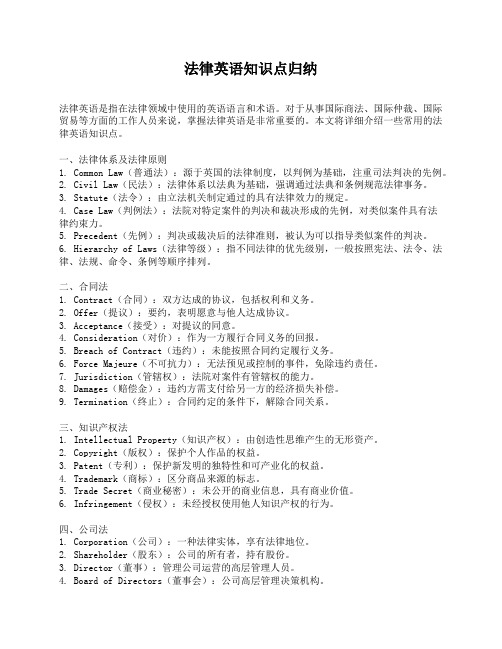如何学习法律英语
法律英语知识点归纳

法律英语知识点归纳法律英语是指在法律领域中使用的英语语言和术语。
对于从事国际商法、国际仲裁、国际贸易等方面的工作人员来说,掌握法律英语是非常重要的。
本文将详细介绍一些常用的法律英语知识点。
一、法律体系及法律原则1. Common Law(普通法):源于英国的法律制度,以判例为基础,注重司法判决的先例。
2. Civil Law(民法):法律体系以法典为基础,强调通过法典和条例规范法律事务。
3. Statute(法令):由立法机关制定通过的具有法律效力的规定。
4. Case Law(判例法):法院对特定案件的判决和裁决形成的先例,对类似案件具有法律约束力。
5. Precedent(先例):判决或裁决后的法律准则,被认为可以指导类似案件的判决。
6. Hierarchy of Laws(法律等级):指不同法律的优先级别,一般按照宪法、法令、法律、法规、命令、条例等顺序排列。
二、合同法1. Contract(合同):双方达成的协议,包括权利和义务。
2. Offer(提议):要约,表明愿意与他人达成协议。
3. Acceptance(接受):对提议的同意。
4. Consideration(对价):作为一方履行合同义务的回报。
5. Breach of Contract(违约):未能按照合同约定履行义务。
6. Force Majeure(不可抗力):无法预见或控制的事件,免除违约责任。
7. Jurisdiction(管辖权):法院对案件有管辖权的能力。
8. Damages(赔偿金):违约方需支付给另一方的经济损失补偿。
9. Termination(终止):合同约定的条件下,解除合同关系。
三、知识产权法1. Intellectual Property(知识产权):由创造性思维产生的无形资产。
2. Copyright(版权):保护个人作品的权益。
3. Patent(专利):保护新发明的独特性和可产业化的权益。
4. Trademark(商标):区分商品来源的标志。
法律英语词汇学习

法律英语词汇学习1. 引言法律英语是法律学习的重要组成部分,掌握法律英语词汇是理解和运用法律文件的基础。
本篇文档将介绍一些常用的法律英语词汇,帮助读者更好地理解和运用法律英语。
2. 常用法律英语词汇2.1 法律文件在学习法律英语之前,首先需要了解一些常见的法律文件类型。
以下是一些常用的法律文件的英文表达:•Constitution: 宪法•Statute: 法令•Regulation: 规定•Ordinance: 条例•Decree: 法令/法令书•Directive: 指令•Treaty: 条约•Agreement: 合同•Contract: 合同•Memorandum of Understanding (MoU): 谅解备忘录2.2 法律流程和程序学习法律英语,也需要了解一些常见的法律流程和程序。
以下是一些常用的法律流程和程序的英文表达:•Lawsuit: 诉讼•Hearing: 审理/听证会•Trial: 审判•Appeal: 上诉•Verdict: 裁决•Judgement: 判决•Defendant: 被告•Plntiff: 原告•Witness: 证人•Subpoena: 传票•Petition: 请愿•Settlement: 和解2.3 法律术语掌握常用法律术语对理解法律文件和案件非常重要。
以下是一些常见的法律术语的英文表达:•Legal liability: 法律责任•Breach of contract: 违约•Intellectual property: 知识产权•Tort: 侵权行为•Negligence: 过失•Force majeure: 不可抗力•Injunction: 禁令•Liability insurance: 责任保险•Statute of limitations: 诉讼时效•Confidentiality agreement: 保密协议•Arbitration: 仲裁3. 学习方法3.1 阅读法律文件阅读法律文件是学习法律英语的重要方法之一。
法律英语入门学习计划

法律英语入门学习计划IntroductionLegal English is the language used in law-related professions and activities, which includes the language used in the court, legal documents, and legal correspondence. As an important tool for those working in the legal field, having a good understanding of Legal English is crucial for communication, interpretation, drafting legal documents, and understanding legal and court proceedings.For those who are not native speakers of English, learning Legal English can be quite challenging. This study plan is designed to provide a comprehensive guide for non-native English speakers who are interested in learning Legal English. This plan will cover the basic concepts, resources, and strategies for learning Legal English efficiently.1. Understanding Legal EnglishBefore starting to learn Legal English, it is important to have a clear understanding of what Legal English is and how it differs from general English. Legal English is characterized by its precision, formality, and its use of technical vocabulary and legal jargon. It requires a good understanding of legal terminology, legal principles, and the legal system.One of the best ways to understand Legal English is to study legal texts, such as contracts, statutes, and case law. By reading and analyzing legal documents, one can gain a better understanding of the unique language and structure used in Legal English.2. Building a Legal VocabularyA good grasp of legal terminology is essential for understanding Legal English. Legal language is often filled with specialized vocabulary and technical terms that may not be commonly used in everyday English. Therefore, it is important to build a strong legal vocabulary through constant practice and exposure.Some of the best ways to build a legal vocabulary include:- Using legal dictionaries and glossaries to look up legal terms and their definitions.- Reading legal texts, such as case law, statutes, and legal articles to encounter legal terms in context.- Participating in legal English classes or study groups to learn and practice legal terminology with others.3. Studying Legal Concepts and PrinciplesUnderstanding basic legal concepts and principles is essential for learning Legal English. Legal concepts, such as due process, liability, and precedent, are crucial for understanding legal language and reasoning. Additionally, a good understanding of the legal system and itsprocesses is necessary for interpreting legal documents and communicating effectively in legal settings.There are various resources available to help non-native English speakers learn about legal concepts and principles. These resources include legal textbooks, online courses, and legal English tutorials. It is important to study these resources thoroughly and apply the concepts learned to real-life legal scenarios.4. Practice Reading and Writing Legal EnglishReading and writing are essential skills for learning Legal English. Regular and consistent practice in reading and writing legal English is important for improving comprehension and expression. Reading legal texts and writing legal documents are the best ways to sharpen these skills.To practice reading legal texts, one can access legal documents such as court decisions, contracts, and statutes, and read them attentively to understand the legal language and structure. Additionally, non-native speakers can benefit from reading legal materials written in their native language and comparing them with their English translations to understand the nuances of legal language.To practice writing legal English, non-native speakers can start by drafting simple legal documents, such as contracts, memoranda, and legal correspondence. Seeking feedback from native English speakers or legal professionals can help improve writing skills significantly.5. Participating in Legal English TrainingJoining legal English training programs and courses is an effective way for non-native English speakers to gain a deeper understanding of Legal English. These training programs are designed to provide comprehensive instruction and practice in legal terminology, writing legal documents, and understanding legal discourse.Legal English training programs may include language courses, workshops, and seminars specifically tailored for non-native English speakers. These programs often provide opportunities to engage with legal professionals and language experts, who can provide valuable insights and feedback.6. Utilizing Resources for Learning Legal EnglishNon-native English speakers can benefit greatly from utilizing various resources to aid in the learning process. Some of the resources that can be helpful in learning Legal English include:- Legal dictionaries and glossaries: These resources provide definitions of legal terms and help in understanding legal vocabulary.- Online legal English courses and tutorials: Various websites offer online courses and tutorials that focus on legal English, covering topics such as legal writing, legal vocabulary, and legal concepts.- Legal textbooks and articles: Reading legal textbooks and articles can help in gaining a deeper understanding of legal language and principles.- Legal English study groups: Participating in study groups or discussion forums with other non-native English speakers can provide a supportive environment for learning and practicing legal English.ConclusionIn conclusion, learning Legal English can be a challenging but rewarding endeavor for non-native English speakers. By understanding the unique language and concepts of the legal field, building a strong legal vocabulary, and practicing reading and writing legal English, non-native speakers can improve their ability to communicate effectively in legal settings. Utilizing resources, participating in legal English training, and consistently practicing are crucial for mastering Legal English. With determination and effort, non-native English speakers can enhance their proficiency in Legal English and advance their careers in the legal profession.。
司法考试中的法律英语如何备考与应对

司法考试中的法律英语如何备考与应对司法考试是一项重要的资格考试,对于想要从事法律职业的人来说,掌握法律英语是必不可少的。
在备考和应对司法考试中的法律英语部分时,有一些方法和技巧可以帮助考生提高备考效果和应试水平。
一、打造良好的学习环境学习环境对于备考司法考试中的法律英语至关重要。
考生可以选择一个安静、整洁的学习空间,避免干扰和噪音。
同时,保持良好的学习习惯,定时规律地进行学习并合理安排学习时间,可以提高学习效果。
二、积累法律英语词汇备考司法考试的关键是掌握大量的法律英语词汇。
考生可以通过多读法律文书、审判案例、法律期刊等方式,积累相关词汇。
同时,使用词汇卡片、记忆法以及参加专业培训等方法都可以加强词汇的记忆与掌握。
三、阅读法律英语材料阅读法律英语材料是提高法律英语能力的有效途径。
考生可以阅读各种法律英语书籍、判例以及相关的法律文件和法规,通过阅读,感受法律英语的特点和结构,提高阅读理解能力。
同时,学习解读并总结法律条文,分析法律问题,有助于提高技巧和素养。
四、刷题与模拟练习熟悉考试题型,了解考试要求是备考司法考试的必备基础。
考生可以通过刷题和模拟练习来熟悉考试形式和内容。
可以选择一些经典的法律英语试题,逐题进行分析和解答,并及时总结复习不足和错误的地方,加以纠正。
五、参加培训课程或辅导班对于想要提高法律英语能力的考生来说,参加培训课程或辅导班是一个有效的方法。
通过专业老师的指导和引导,可以系统地学习和掌握法律英语的相关知识和技巧。
老师可以传授备考经验,解答学生的疑惑,提供专业的模拟测试和评估,帮助考生更好地备考和应对考试。
六、强化听力能力法律英语听力是考试中的重要环节。
考生可以通过听取各类法律英语资料,如录音材料、法庭审判记录等,提高听力能力和理解能力。
同时,可以选择一些专门针对法律英语听力提供的训练资料和教材进行练习,熟悉考试中的听力题型和考点。
七、培养口语表达能力在备考和应对司法考试中的法律英语时,口语表达能力也是重要的。
如何才能学好法律英语

如何才能学好法律英语一、建立良好的学习习惯想要学好法律英语,首先要建立良好的学习习惯。
每天都要安排专门的时间进行法律英语的学习,保持持久的学习态度。
可以利用早上或晚上的空余时间进行学习,尤其是在自己最清醒的时候。
建议每天至少学习1-2个小时,持之以恒。
二、扩大词汇量法律英语是一门专业性很强的语言,其中有很多专业术语和法律名词需要掌握。
因此,扩大词汇量是学习法律英语的关键。
可以通过背单词、阅读法律文献、听力训练等方式来逐渐积累词汇量。
建议可以购买一本专门的法律英语词汇书籍,每天背诵一些专业术语和法律名词,逐渐形成自己的法律英语词汇表。
三、多听多说学习一门语言最重要的就是听说能力。
法律英语是一门强调专业性的语言,因此要锻炼听说能力就需要多听多说。
可以通过听法律英语节目、看法律英语电视剧、听力练习等方式来提升自己的听说能力。
同时,也可以找一些法律英语的学习伙伴,进行口语练习,互相交流学习,相互促进。
四、阅读法律文献阅读法律文献是学习法律英语的有效方法。
可以在阅读法律英语文献的同时学习法律知识,加深对法律英语的理解。
建议可以选择一些简单的法律英语文献,逐渐提高阅读难度,不断挑战自己。
同时也可以通过阅读法律英语文献来提升自己的词汇量和专业知识。
五、参加法律英语培训班如果条件允许,可以参加一些专门的法律英语培训班,通过系统的学习提升自己的法律英语水平。
培训班通常会设计针对性的课程,培养学生的听说读写等多方面能力,同时也可以和其他同学进行交流学习,相互督促,相互提升。
总之,学习法律英语虽然不容易,但只要有耐心和恒心,相信一定可以学好。
希望以上的建议能够帮助大家更好地学习法律英语,提高自己的专业水平。
如何学好法律英语英语作文

如何学好法律英语英语作文1. Build a strong foundation in general EnglishBefore delving into the intricacies of legal English, it is important to have a solid grasp of general English language skills. This includes vocabulary, grammar, reading comprehension, and writing skills. You can improve your general English by reading extensively, practicing writing regularly, and engaging in conversations with native speakers. There are also numerous online resources, such as language learning apps, websites, and podcasts, that can help you strengthen your general English skills.2. Understand legal terminologyLegal English is characterized by the use of specialized terminology that is unique to the field of law. To effectively communicate in legal settings, it is essential to familiarize yourself with legal terminology and concepts. You can start by compiling a list of common legal terms and definitions and reviewing them regularly. Additionally, reading legal texts, such as court decisions, statutes, and legal documents, can help you become more familiar with legal language and terminology.3. Take legal English coursesEnrolling in a legal English course can be a valuable investment in your language learning journey. There are numerous online and in-person courses available that are specifically designed to help individuals improve their legal English skills. These courses often cover topics such as legal vocabulary, writing legal documents, and conducting legal research. Additionally, many legal English courses provide interactive exercises, case studies, and real-life scenarios to help students practice their language skills in a legal context.4. Practice writing legal documentsOne of the best ways to improve your proficiency in legal English is to practice writing legal documents. This can include drafting legal briefs, memoranda, contracts, and other types of legal documents. Writing practice can help you develop your legal writing skills, master legal formatting and citation conventions, and become more comfortable with legal language. You can also seek feedback from legal professionals or language instructors to further improve your writing skills.5. Engage in legal discussions and debatesParticipating in legal discussions and debates can help you improve your speaking and listening skills in legal English. You can join legal English study groups, attend legal seminars and workshops, or engage in online forums and discussion boards focused on legal topics. Practicing legal conversations and debates can help you become more confident in expressing your thoughts and opinions in a legal context, as well as improve your ability to understand complex legal arguments and concepts.6. Read legal texts and materialsReading legal texts and materials is an important aspect of learning legal English. This can include reading court decisions, statutes, legal textbooks, articles, and other legal publications. Reading legal texts can help you become more familiar with legal language, structures, and conventions. It can also improve your understanding of legal concepts, principles, and reasoning. Additionally, reading legal materials can help you stay updated on current legal issues and trends.7. Use online resources and toolsThere are numerous online resources and tools available that can help you learn and improve your legal English skills. For example, online dictionaries and glossaries can help you look up legal terms and definitions. Legal writing guides and templates can help you draft legal documents more effectively. Language learning apps and websites can provide interactive exercises and quizzes to help you practice your legal English skills. Additionally, online forums and communities can connect you with other learners and legal professionals for support and collaboration.8. Seek feedback and guidanceFinally, seeking feedback and guidance from legal professionals, language instructors, and peers can be a valuable way to improve your legal English skills. You can ask for feedback on your writing, speaking, and comprehension skills, as well as guidance on specific legal topics and concepts. Additionally, working with a mentor or tutor who is proficient in legal English can provide you with personalized support and advice on how to continue improving your language skills.In conclusion, learning legal English is a challenging yet rewarding journey that requires dedication, practice, and continuous learning. By building a strong foundation in general English, understanding legal terminology, taking legal English courses, practicing writing legal documents, engaging in legal discussions and debates, reading legal texts and materials, using online resources, and seeking feedback and guidance, you can improve your proficiency in legal English and become more confident in your ability to communicate effectively in a legal setting.。
如何学好法律英语作文
如何学好法律英语作文一、建立良好的基础学习任何一门语言都需要建立良好的基础。
学习法律英语也不例外。
在开始学习法律英语之前,建议先掌握基本的英语语法、词汇和句型结构。
可以通过课堂学习、自学、在线课程等途径来提高英语水平。
掌握好基础后,再进一步学习法律英语会更顺利。
二、了解法律英语的特点法律英语是一门专业性很强的英语,其特点是术语繁多、语言风格正式、逻辑严谨。
在学习法律英语时,需要熟悉常用的法律术语和表达方式,了解不同国家的法律体系和法律规定,增加对法律英语的敏感度和理解力。
三、积累法律英语词汇法律英语是一个术语较多的领域,学习法律英语首先要积累法律英语词汇。
可以通过阅读法律文献、参加法律培训、听取法律专业讲座等方式来积累词汇。
同时,可以通过制作词汇卡片、背诵法律英语词汇等方式来巩固记忆。
四、阅读法律英语文献阅读法律英语文献是学习法律英语的重要途径之一。
可以通过阅读法律期刊、法律案例、法律教材等来提高法律英语的阅读能力。
在阅读过程中,要注意理解文章的主旨、逻辑结构和论证思路,掌握文章的关键词和短语,提高阅读速度和逻辑思维能力。
五、听取法律英语讲座听取法律英语讲座是学习法律英语的有效途径之一。
可以通过参加法律英语培训班、听取法律英语讲座、与法律英语专家交流等方式来提高听力水平和语言表达能力。
在听取讲座时,要注意听懂讲者的观点、理解讲者的意图和表达方式,灵活运用所学的法律英语知识。
六、参与法律英语写作写作是学习法律英语的重要手段之一。
可以通过撰写法律英语文章、法律英语作文、法律英语论文等方式来提高写作能力。
在写作过程中,要注意规范语言表达、逻辑连贯、语法准确,培养文字表达能力和创新思维能力。
七、学习法律英语口语口语是学习法律英语的重要环节之一。
可以通过参加法律英语口语课程、与外国律师交流、参加模拟法庭等方式来提高口语表达能力。
在口语练习中,要注意发音准确、语调自然、表达清晰,提高口语表达能力和沟通技巧。
法律英语教程宋雷知识点
法律英语教程宋雷知识点第一步:了解法律英语的重要性法律是一门严谨的学科,其使用的语言也需要具备准确性和精确性。
法律英语作为法律专业人士必备的技能之一,是在处理国际法律事务和跨国商务中不可或缺的能力。
掌握法律英语可以帮助我们更好地理解法律文件和条款,与国际伙伴进行有效沟通,并在法律实务中取得成功。
第二步:学习法律英语的基础知识在学习法律英语之前,我们应该先了解一些基本的法律英语术语和常用词汇。
例如,法律文件中常用的词汇如“合同”(contract)、“协议”(agreement)、“法律责任”(legal liability)等,都是我们在学习过程中需要掌握的内容。
此外,掌握法律英语的语法和句型结构也是非常重要的。
第三步:熟悉法律文件的阅读和理解法律文件通常包含复杂的词汇和句子结构,因此,我们需要学会如何正确地阅读和理解这些文件。
在阅读法律文件时,我们应该注意文档的结构和组织方式,并仔细理解每个词汇和句子的含义。
此外,了解常见的法律术语和惯用语可以帮助我们更好地理解文件的内容。
第四步:学习法律英语的写作技巧法律文件通常需要使用正式、明确和具体的语言来表达观点和意图。
因此,在学习法律英语的写作技巧时,我们应该注重语法和词汇的正确使用,避免使用模糊和含糊不清的表达方式。
此外,学习如何撰写法律文件的结构和格式也是非常重要的。
第五步:提高听力和口语技巧在法律实务中,良好的听力和口语技巧对于与他人进行有效沟通至关重要。
因此,我们应该通过听取法律英语的讲座、辩论和讨论等活动来提高我们的听力技巧。
同时,通过参与角色扮演和模拟法庭等活动,我们可以提高我们的口语表达能力。
第六步:了解不同国家的法律体系学习法律英语还需要了解不同国家的法律体系。
不同的国家有不同的法律体系和法律术语,因此我们需要学习和了解这些差异。
比如,英美法系和大陆法系在法律体系和用词上存在很大的差别,我们需要学会正确使用各自的法律术语和表达方式。
第七步:实践法律英语技能最后,我们应该通过实践来巩固和提高我们的法律英语技能。
如何学好法律英语(一)(共5篇)
如何学好法律英语(一)(共5篇)第一篇:如何学好法律英语(一)免费?宅在家学英语?怎么报名?最牛英语口语培训模式:躺在家里练口语,全程外教一对一,三个月畅谈无阻!如何学好法律英语(一)今天我们洛基新开通了一个《法律英语》的专栏,旨在向大家介绍一些基础的法律英语知识,包括如何学好、常用词汇、经典对话、法律文本等等,希望大家喜欢。
第一篇就向大家介绍如何学好法律英语这个大问题,这只是一个网友的意见,大家可以酌情看之,量身定制自己的法律英语学习计划。
1、关于法律文件的翻译:学习法律英语,碰到最多的就是翻译法律文件了,这里的文件一般包括法律、规章、条例、条约、协定、合同、章程、保证书、判决书等等。
在联合国范围内则有国际法院的判决和咨询意见,大会和安全理事会的决议,联合国国际法委员会草拟的条款草案和其他文件等。
法律英语翻译自然不同于一般的中英互译。
从专业方面说,翻译法律文件要有法律专业的知识,否则难以正确理解原文,也不会正确地表达出来。
翻译英文法律文件困难更多。
因为世界上有两个主要的法律体系,一个是英美法系或普通法法系,另一个是大陆法系或民法法系。
我国在旧中国时代属于大陆法系,在新中国时代则不属其中任何一个法系,自成一个独立的法系,但比较接近于大陆法系。
英文法律文件大多属于英美法系,其中的用语、概念与我国的用语、概念差异甚多,甚至是较大的差异,有的概念、制度在中国并不存在,所以要译成中文就碰到难题,没有适当的译法。
洛基英语是中国英语培训市场上的一朵奇葩,是全球已被验证的东方人英语学习的最佳模式。
洛基英语是中国专业在线英语培训机构,通过电话英语、视频英语与外教一对一的模式提高学员英语口语水平,提供英语口语培训,成人英语培训,商务英语培训,企业英语培训等课程。
免费?宅在家学英语?怎么报名?例如英国律师有两类:barristert和solicitor,而中国只有一类,如何译?香港将barrister译为“大律师”,而将solicitor译为“律师”,这样译明显地将二者定出高低等级,是不可取的。
法律英语
14、语言不需要天才,只需要功夫,关键在于持之以恒。英美法的东西就是要靠多读多看,不要轻易地被沮丧所击败(frustrated),无论如何一定要有面对它的勇气和决心,要有耐心,毅力。坚持,坚持,再坚持!
四、详细学习计划
(一)英美法基础
1、教材:
《Burnham美国法律与法律制度概论,美国案例书系》
《英文合同阅读与分析技巧》范文祥著 法律出版社
3、起草英文合同
教材:《合同与法律咨询文书制作技能》吕立山 江宪胜著
(四)法律英语写作和翻译
(五)Legal Research
1、教科书:
《英美法案例研读全程指南》
作者:何主宇编著 出版社:法律出版社 出版时间:2007-12-1 定价:70元
(三)合同法
1、英美合同法基础
教材:《美国合同法:判例、规则和价值规范》张利宾著法律出版社
2、如何阅读英文合同
教材:《英文合同解读:语用、条款及文本范例》王辉著法律出版社
2、其他参考读物
(1)《Geoffrey C. Hazard, Jr, and Michele Taruffo, American Civil Procedure:An Introduction》 (Yale Contemporary Law Series) Price: $21.00
(2)《英美法导论》林利芝译 中国政法大学出版社
6、最好手头有一本英文法律词典,含有对法律名词的英文解释,最好的当然是black’s law dictionary.坚持用原版的法律词典,尽量不用或少用英汉法律词典。
7、在学习英美部门法的同时温习相应的中国部门法,这样对两者间的差异会有更深的了解。
- 1、下载文档前请自行甄别文档内容的完整性,平台不提供额外的编辑、内容补充、找答案等附加服务。
- 2、"仅部分预览"的文档,不可在线预览部分如存在完整性等问题,可反馈申请退款(可完整预览的文档不适用该条件!)。
- 3、如文档侵犯您的权益,请联系客服反馈,我们会尽快为您处理(人工客服工作时间:9:00-18:30)。
学好英语就比较难了,关于法律英语,很多同学就更不知道怎么面对这么枯燥的科目,湖北专升本网的小编在这里告诉大家,学习法律英语,不能仅以会读、会写几个词汇就觉得万事大吉,要清楚自己的目标、学习的层次,循序渐进,渐次登堂入室。
根据不同的层次,大致可分一下几个类型:
1.入门搭框型:了解法律英语的基本词汇、语用同时西方法律、司法基本体系构架,即Mr. 何家弘的“一石二鸟”。
可以学习下何家弘的《法律英语》(法律出版社,2003第二版,好像已有配套翻译)。
这种书要精读。
试着自己动手翻译一遍,事半功倍。
基础好同学可以接着读一点,英国人或美国人专门给外国人学法律英语的书。
2.专业型拓展型:拓展下自己的专业或者自己喜欢的领域。
建议通读一本相关领域的简明教材,例如blackstone,nutshell系列的都不错的。
另外,以熟悉的领域为核心,是提高英语的水平的有效捷径。
3.比较参考型:即研究某个课题外国是否有相同的法律规定、案例规则等。
学会泛读,把握主旨。
以精读课的方式来读,反而会让自己陷入生词、查词旋涡。
类似方面的,可以读一些案例。
4.日常应用型:即与法律有关的日常业务中,处理涉外信函。
注意学习一些商务信函的知识和相关领域的常用词汇、句型、格式。
推荐《国际商务写作教程》(王素清,对外经贸大学出版社)。
日常应用的专业词汇、句型跟法律英语教材、案例书籍、法条等的具有很大差别,这是新手一定要注意的。
多阅读些此前的卷宗,虚心学习,不怕
修改,三几个月就能顺手了。
5.专业应用型:即出具外语法律文书、法律建议,如合同等。
最保险的还是找一些类似的格式文书照搬过来,格式文书在网上能够搜索的到,或者参考此前业务成文。
6.翻译通才型:即从事涉及法律内容的材料翻译。
多读、多练、功夫在诗外。
中英文方面的法律书都通读些,一些基本的简明教程即可。
另外,还应当以法律为中心,多关注关联的知识、学法律的人,大多学过英语。
但精通法律英语的人却很少。
其主要原因,在于方法不当。
过分重视字词、语法、句型等";微观" ;的语言现象,而忽略了对法律的整体理解和宏观把握,用学习语言的方法学习法律,是传统学习法之大弊。
